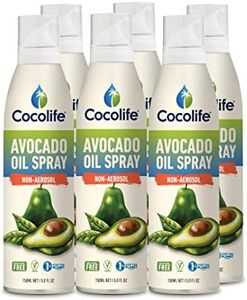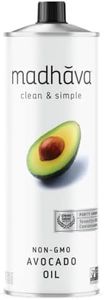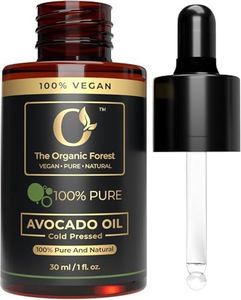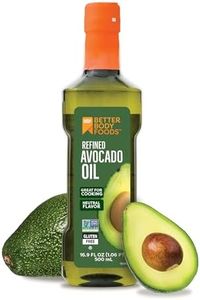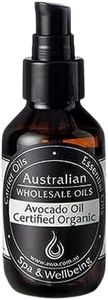We Use CookiesWe use cookies to enhance the security, performance,
functionality and for analytical and promotional activities. By continuing to browse this site you
are agreeing to our privacy policy
10 Best Avocado Oils
From leading brands and best sellers available on the web.By clicking on a link to a third party's website, log data is shared with that third party.
Buying Guide for the Best Avocado Oils
Choosing the right avocado oil can make a difference in both your cooking results and health benefits. Avocado oil is valued for its versatility, mild flavor, and nutritional profile. When selecting avocado oil, you'll want to think about how you plan to use it—in cooking, salad dressings, or as a finishing oil—and what qualities matter most to you, such as taste, smoke point, and processing method. Understanding these key aspects will help you find an avocado oil that matches your personal cooking style and health preferences.Type (Refined vs. Unrefined)This spec refers to how the avocado oil is processed. Unrefined (sometimes labeled as 'virgin' or 'extra virgin') oil is minimally processed and retains more of its natural nutrients, distinct avocado flavor, and green color. Refined avocado oil goes through additional filtering that removes many flavors and impurities, resulting in a lighter taste and a much higher smoke point. If you want to use oil for high-heat cooking, like frying or roasting, refined oil will perform better. For salads, dips, or drizzling, unrefined oil offers a richer taste and more nutrients.
Smoke PointThe smoke point is the temperature at which the oil starts to burn and smoke, which can create unpleasant flavors and potentially harmful compounds. Avocado oil is known for a high smoke point, but refined versions can handle even higher temperatures—sometimes over 500°F (260°C)—making them ideal for most cooking methods. Unrefined oil usually has a lower smoke point, suitable for sautéing and baking. To pick the right one, consider the cooking techniques you use most often—higher smoke points are great for grilling and frying, moderate ones for lighter sautéing.
Flavor and AromaFlavor varies with how the oil is processed. Unrefined avocado oil tends to have a buttery, slightly grassy taste with an avocado-like aroma, while refined oil is more neutral and mild. The choice depends on whether you want the avocado oil to add noticeable flavor to your dishes (go for unrefined) or if you'd rather it blend in without altering the taste (choose refined). For uses where oil is a prominent ingredient, as in salad dressings or dipping, flavor matters more; for general cooking, a mild flavor may be preferable.
Color and ClarityAvocado oil can range from vibrant green to pale yellow, depending on its processing. Unrefined oils are usually greener due to the presence of natural pigments, while refined ones are much clearer and lighter. This color difference can indicate nutrient content and taste. If you value the visual appeal and richness of the oil, unrefined is best. For those who want a neutral look, refined oil may be the way to go.
PackagingPackaging affects freshness and shelf life, as avocado oil can be sensitive to light and air. Dark glass bottles protect the oil from light exposure that can cause it to degrade or go rancid. Some oils are also sold in cans or opaque bottles for similar reasons. When picking, look for dark, airtight containers, especially for unrefined oils, to ensure maximum freshness and flavor.
Purity and CertificationsPurity refers to whether the oil is made solely from avocados or if it's mixed with other oils. Certifications, such as 'organic' or 'non-GMO,' can be important if you care about how the avocados are grown. If you want to avoid additives or contamination with lower-quality oils, check labels for 100% avocado oil and consider options with quality certifications. These choices are particularly relevant if you prioritize natural and sustainable food options.
